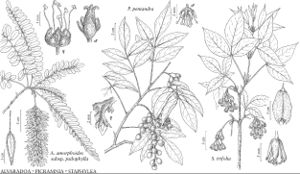Shrubs or trees, rarely subshrubs, dioecious. Stems usually single, wood dense. Leaves usually persistent, cauline, alternate, imparipinnately compound; stipules absent; petiole present; blade usually chartaceous, margins entire, leaflets alternate or subopposite (often darkening upon drying), bases of lateral leaflets often oblique. Inflorescences terminal or lateral, simple racemes (either of separate flowers or glomerules of flowers), pendent, or compound thyrses. Flowers unisexual, perianth and androecium hypogynous; epicalyx bractlet absent; hypanthium absent; sepals [3–]5, basally connate or distinct; petals [3–]5, sometimes 0, distinct, stramineous to maroon or red, usually ligulate; stamens or staminodia (if present) (3–)5, distinct, antipetalous, anthers longitudinally dehiscent; staminate flowers: (filaments unappendaged) intrastaminal discs or, rarely, column present, pistillodia usually conic and hairy or vestigial; pistillate flowers: staminodia present or absent; pistils 1, 2–3(–4)-carpellate, ovary borne on disc or gynophore, placentation apical, styles 2–3(–4), usually ± lacking, stigmas sessile and divergent on apices of ovaries; ovules 2 or 3 per locule. Fruits berries or samaras; sepals often persistent; stigmas persistent. Seeds 1, not arillate.
Distribution
Fla., Mexico, West Indies, Central America, South America.
Discussion
Genera 3, species 52 (2 genera, 2 species in the flora).
The length of the pedicel is taken from fruiting material for Alvaradoa and Picramnia. The third genus, Nothotalisia W. W. Thomas, is known from Panama and northwestern South America with three species.
